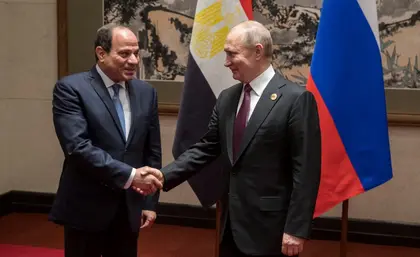Every day brings new revelations about the US information leaks.
Today one of the big reveals comes from The Washington Post, whose reporters have been diligently perusing the trove of documents scattered online over the past two months: “Egypt’s President Abdel Fatah el-Sisi, one of America’s closest allies in the Middle East and a major recipient of US aid, recently ordered subordinates to produce up to 40,000 rockets to be covertly shipped to Russia, according to a leaked US intelligence document.”
JOIN US ON TELEGRAM
Follow our coverage of the war on the @Kyivpost_official.
The top secret document, according to the Washington Post report, describes Sisi issuing instructions on Feb. 1 for keeping the supply of rockets secret in order to avoid problems with the West, “telling a person referenced only as Salah al-Din [probably Mohamed Salah al-Din, the minister of state for military production] that factory workers should be told the projectiles are intended for the Egyptian army.”
In the document, Sisi is quoted as saying that he was considering selling “ordinary stuff” to China to make room for “more Sakr 45 production,” a reference to a type of 122mm rocket manufactured by Egypt. The document does not explicitly say whether the rockets that would be produced for Russia were Sakr 45s, but such rockets would be compatible with Russian Grad multiple rocket launchers.
Wait, aren’t the Egyptians allies of the US?

Ukraine Fires First Long-Range US Missiles into Russia, Kremlin Vows Response
They certainly are. And they are one of the biggest recipients of military aid from Washington, after Israel, Jordan, and now especially Ukraine.
The document quotes Salah al-Din as saying he would “order his people to work shift-work if necessary because it was the least Egypt could do to repay Russia for unspecified help earlier.”
Have the Russians been helping Egypt?
Most definitely. In Libya, which shares borders with Egypt, Sisi has long thrown his weight behind Khalifa Haftar and his Libyan National Army. Egypt continues to support Haftar.
The US, on the other hand has been very ambivalent about who to support in Libya. Initially, after Muammar Gaddafi was overthrown in 2011, Washington supported Haftar. In fact, since Haftar had spent much of the 1990s and 2000s living in the suburbs of Washington DC after the US helped release him from a prison in Chad in 1987, he was considered by most Libya specialists to be a CIA asset.
When Haftar fell out of favor with Washington, the Americans put their weight behind the Tripoli-based Government of National Accord (GNA) – along with Italy, Qatar and, most importantly, Turkey.
The Egyptians, however, continued to support Haftar, who has been based in Tobruk, much closer to the Egyptian border.
When Turkey stepped in to support the GNA in 2020, Russia – along with the Wagner private military company -- came to the rescue with increased military assistance.
Why would Egypt risk its relationship with the US?
Quite simply, it’s all about the Muslim Brotherhood. Founded in Egypt by Islamic Scholar Hassan al-Banna in 1928, the Sunni Muslim organization has been the bane of secular Arab authoritarian leaders since its inception.
Essentially, the Muslim Brotherhood’s ideology opposes any sort of “secular” leadership – that is, a government that does not explicitly uphold the precepts of Sunni Islam.
The Muslim Brotherhood has been banned on several occasions in Egypt, most recently in 2012, by Sisi.
The Brotherhood’s candidate for president, Mohamed Morsi, had won the 2012 election and was promptly overthrown by then General Sisi. Morsi spent the rest of his life in prison, where he died in 2019.
In Syria, too, the Muslim Brotherhood has been the sworn enemy of Bashar al-Assad and his father Hafez al-Assad, who was responsible for the 1982 Hama massacre, in which Syrian government ‘Defence Brigades’ (Sirayat al-difa’), commanded by Assad’s brother arrested, tortured and executed thousands of Syriansfollowing an uprising by the Muslim Brotherhood.
Today Turkey and Qatar are the biggest supporters of the Muslim Brotherhood.
So when Turkey stepped in to help the Tripoli-based GNA, effectively nixing Sisi’s plans to turn Libya into a satellite state, Cairo most likely sought increased help from Russia, which had been helping Assad in Syria eliminate all Islamist opposition since 2015. The spearhead of Russia’s assistance was Wagner.
So, it’s a matter of “the enemy of my enemy is my friend”?
Partially. It’s also a question of the US’s fickle support.
Sisi was known to be very unhappy with the Obama administration’s support of the democratically elected Morsi. And temperamentally, Sisi is closer to Vladimir Putin, the dictatorial Russian President, scoffing at the idea of an “Islamist democracy” as an oxymoron.
All the same, Egypt will be carefully trying not to jeopardize US assistance – especially since Russian military hardware has performed well below expectations in Ukraine.
And where does Ukraine stand in all this?
Obviously, Ukraine does not want to see Russia get rockets from anyone.
Ukraine also prefers to stay clear of anything having to do with the secular-vs-religious conflicts in Muslim countries.
If it needs to shore up its relations with anyone, then Turkey – which supports the Muslim Brotherhood – is the obvious candidate. Turkey is a NATO member, its navy controls much of the Black Sea and the Bosporus straight bottleneck, through which grain must be shipped—prompting the UN-Turkey brokered deal to guarantee Ukraine’s supply of wheat to the world.
Notably, Turkey has always been a historical counterweight to Russia.
You can also highlight the text and press Ctrl + Enter






